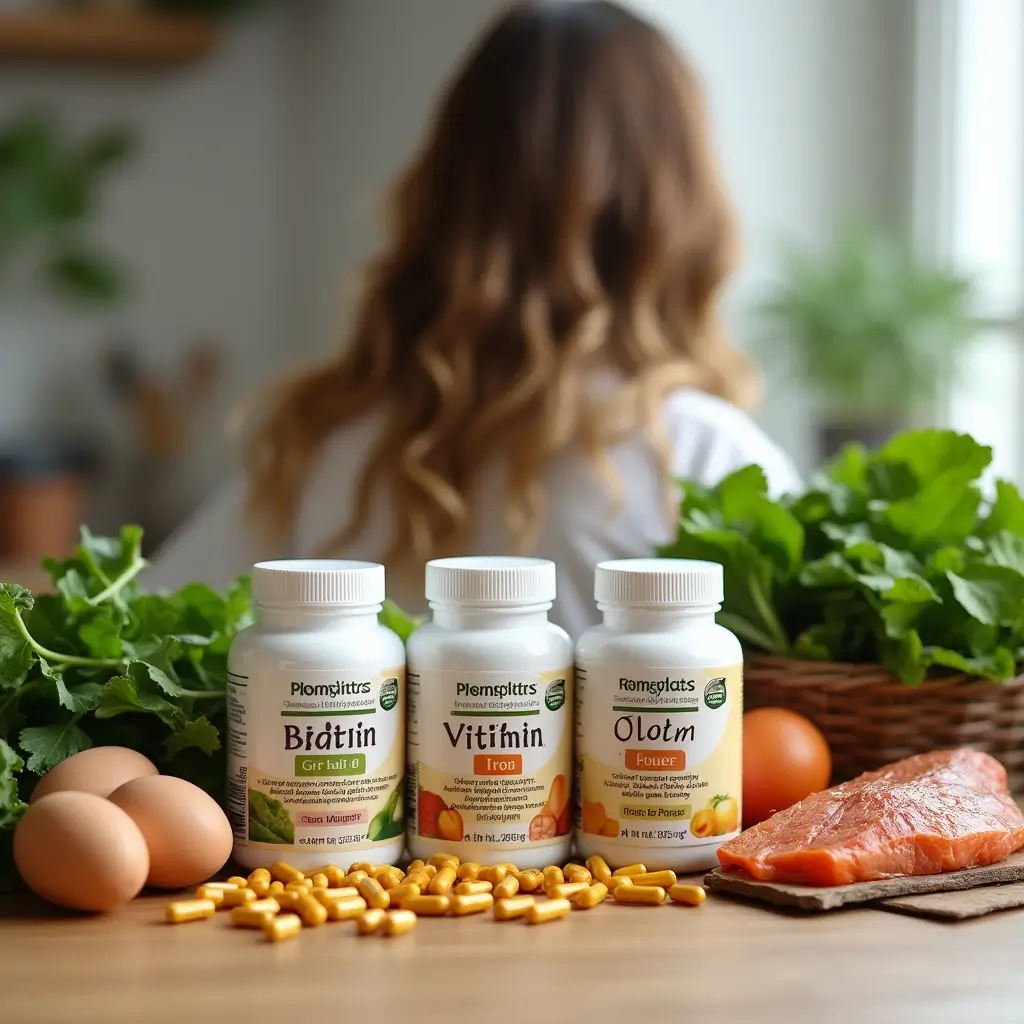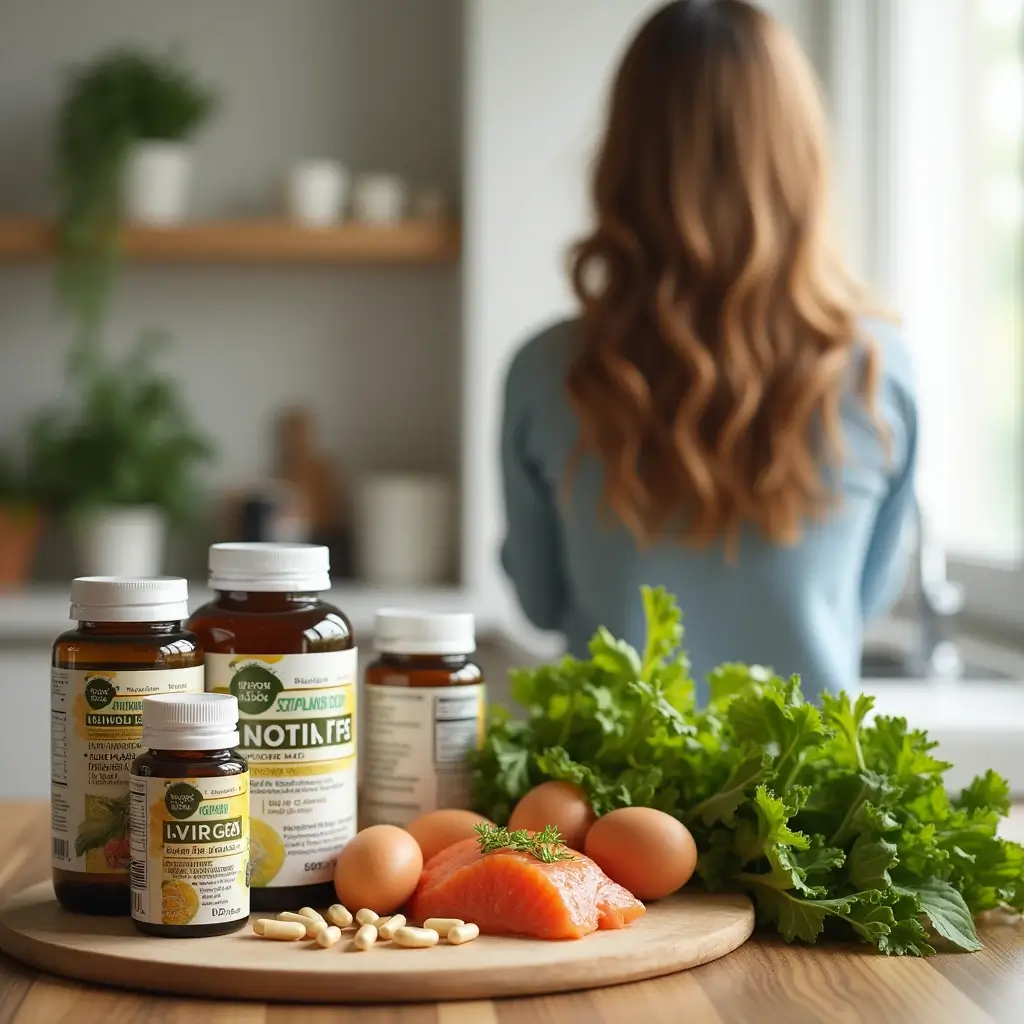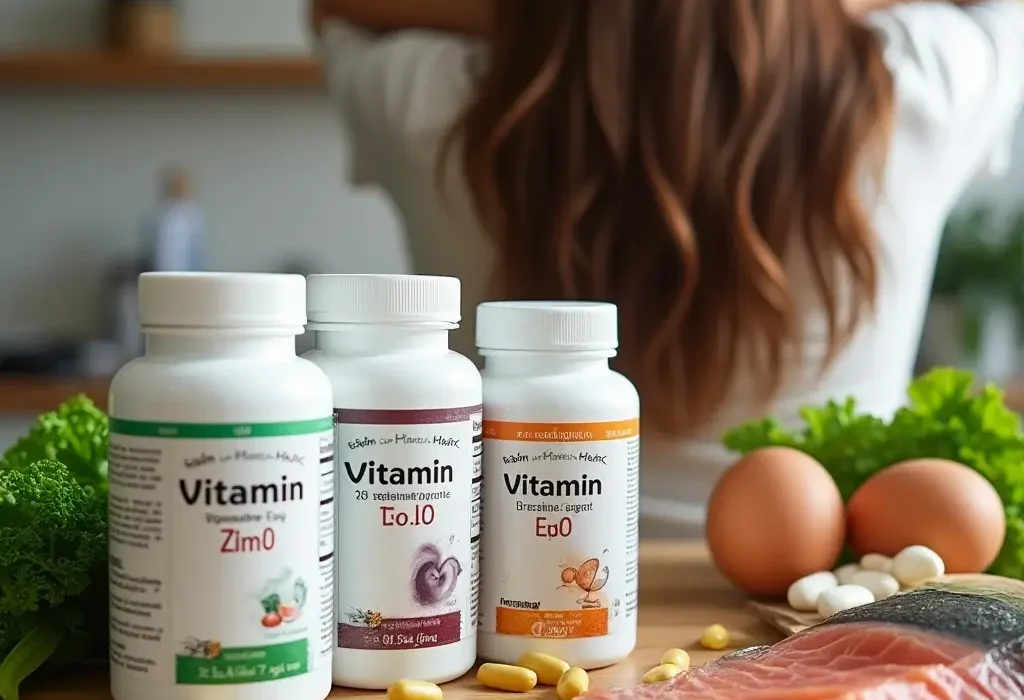Losing hair can be more than just an aesthetic issue—it can impact your confidence, self-esteem, and overall well-being. If you’ve found yourself looking in the mirror, noticing more hair in your brush or on the floor, or feeling concerned about thinning spots, you’re not alone. Hair loss is a common concern for both men and women. Fortunately, the solution may be simpler than you think: your body needs certain vitamins and nutrients to support healthy hair growth. By focusing on the best vitamins for hair loss, you can potentially turn things around and regain the lush, vibrant hair you desire.
In this comprehensive guide, we’ll explore which vitamins and nutrients are essential for preventing hair loss and promoting hair growth. You’ll learn how they work, where to find them, and how to incorporate them into your diet and routine effectively. Let’s dive in and take the first step toward healthier, stronger hair.
Why Vitamins Are Essential for Hair Health
The Science Behind Hair Loss and Nutrition
Hair growth isn’t just about genetics; it’s deeply influenced by what your body needs to thrive. Hair follicles are tiny structures that depend on a consistent supply of vital nutrients to grow and stay healthy. Without the right balance of vitamins and minerals, your hair may become weak, brittle, or begin to fall out prematurely.
A deficiency in key nutrients can disrupt the hair growth cycle, which has three phases: anagen (growth), catagen (transition), and telogen (resting). When your body lacks essential vitamins, the anagen phase can shorten, leading to slower hair growth or premature shedding.
Common Nutrient Deficiencies Linked to Hair Loss
Understanding which vitamins play a crucial role in hair health can help you identify potential gaps in your diet. Here are some of the most common nutrient deficiencies linked to hair loss:
- Iron: This mineral is responsible for delivering oxygen to your hair follicles, which is vital for healthy hair growth. Without enough iron, your hair may become weak, thin, and more prone to breakage.
- Biotin (Vitamin B7): Biotin is essential for keratin production, the protein that makes up your hair. Low biotin levels can lead to brittle, thinning hair.
- Vitamin D: This vitamin plays an essential role in creating new hair follicles and may also help prevent hair loss.
- Zinc: Zinc supports the health of your scalp and helps regulate the oil glands, which can contribute to hair growth when balanced.
- Omega-3 Fatty Acids: These healthy fats are anti-inflammatory and help keep your scalp hydrated, promoting hair growth and preventing dryness.
The Best Vitamins for Hair Loss and How They Help

Biotin (Vitamin B7)
Biotin is arguably the most well-known vitamin for promoting hair growth. It supports the production of keratin, the protein that forms the structure of your hair, skin, and nails. When you don’t get enough biotin, your body can’t produce enough keratin, leading to hair that’s weak and prone to breakage.
Why You Need It: Biotin helps strengthen hair and increases its elasticity, which can prevent breakage and support overall hair health.
Food Sources:
- Eggs
- Almonds and other nuts
- Sweet potatoes
- Whole grains
How to Use It: The recommended daily intake for biotin is about 30 mcg for adults. You can find biotin in supplements, but it’s always best to get it from whole foods when possible.
Vitamin D
Most people associate vitamin D with bone health, but it also plays an essential role in hair growth. Vitamin D helps create new hair follicles, which can result in a thicker hair appearance and prevent hair loss.
Why You Need It: A deficiency in vitamin D is commonly linked to hair thinning and alopecia (a condition that causes hair loss).
How to Use It:
- Sources: Sunlight is the most natural way to get vitamin D. Foods like fortified milk, fatty fish (salmon, mackerel), and egg yolks are good sources.
- Supplementation: If you have limited sun exposure, consider taking a vitamin D supplement, especially during the winter months.
Iron
Iron is crucial for transporting oxygen to the hair follicles. Without adequate oxygen, your hair growth cycle can be disrupted, leading to increased shedding and thinning.
Why You Need It: Iron deficiency anemia is one of the most common causes of hair loss, especially in women. When your body doesn’t have enough iron, hair may become dull, thin, and prone to shedding.
Food Sources:
- Red meat
- Spinach and leafy greens
- Beans and lentils
- Fortified cereals
Tips for Absorption: To help your body absorb iron more effectively, pair it with foods rich in vitamin C, such as citrus fruits, strawberries, and bell peppers.
Zinc
Zinc is often overlooked when it comes to hair care, but it’s an essential mineral that helps with cell growth, repair, and proper functioning of the oil glands on your scalp. These glands help keep your scalp hydrated, reducing dryness and flakiness that can contribute to hair loss.
Why You Need It: Zinc also plays a part in hormone balance, which can be crucial for controlling hair loss. Without enough zinc, your hair follicles may become damaged, leading to thinning and hair loss.
Food Sources:
- Pumpkin seeds
- Chickpeas
- Cashews
- Oysters
How to Use It: The recommended daily intake for adults is 8–11 mg. Be careful not to exceed this, as too much zinc can disrupt the absorption of other essential minerals.
Omega-3 Fatty Acids
Omega-3s are known for their anti-inflammatory properties, and inflammation can be a major factor in hair loss. By keeping the scalp healthy and hydrated, omega-3s create an optimal environment for hair growth.
Why You Need It: Omega-3s nourish the hair and scalp, keeping your hair follicles in good shape and promoting healthy hair growth.
Food Sources:
- Fatty fish like salmon, sardines, and mackerel
- Flaxseeds and flaxseed oil
- Walnuts and chia seeds
Supplementation: If you’re not a fan of fish, omega-3 supplements are a good alternative. Look for fish oil or flaxseed oil capsules.
Vitamin A
Vitamin A is essential for cell growth, which is important for all your body’s tissues, including your hair. It also helps your scalp produce sebum, the natural oil that keeps your hair moisturized.
Why You Need It: While vitamin A supports hair growth, taking too much can lead to toxicity and even hair loss. Balance is key.
Food Sources:
- Sweet potatoes
- Carrots
- Spinach and kale
- Eggs
How to Use It: Aim to get your vitamin A from food sources rather than supplements to avoid overdosing.
Vitamin C
Vitamin C is a powerful antioxidant that helps protect your hair follicles from damage caused by free radicals. It also supports collagen production, which helps strengthen hair and prevent breakage.
Why You Need It: Vitamin C’s antioxidant properties can help reduce hair damage and maintain the health of your hair.
Food Sources:
- Oranges and other citrus fruits
- Strawberries
- Bell peppers
- Broccoli
How to Use It: Most people can get enough vitamin C through their diet. A daily intake of 65–90 mg is ideal for adults.
Collagen
Collagen is the most abundant protein in the body and plays a critical role in maintaining the structure and strength of your hair. It helps your hair stay resilient and less prone to breakage.
Why You Need It: Collagen supplements may promote stronger hair and improve its overall appearance.
Sources:
- Bone broth
- Collagen powder or capsules
- Protein-rich foods like meat, fish, and eggs
Tips for Use: Collagen is often combined with other vitamins like vitamin C to boost its absorption.
How to Incorporate These Vitamins into Your Diet

Top Food Sources for Hair Growth Vitamins
Ensuring you’re getting the right mix of vitamins for hair health can be simple if you include these foods in your diet:
| Vitamin | Food Sources | Daily Serving Size |
|---|---|---|
| Biotin | Eggs, almonds, sweet potatoes | 30 mcg |
| Vitamin D | Salmon, fortified milk, eggs | 600-800 IU |
| Iron | Spinach, red meat, beans | 8-18 mg |
| Zinc | Pumpkin seeds, chickpeas | 8-11 mg |
| Omega-3 Fatty Acids | Salmon, flaxseeds, walnuts | 250-500 mg |
Recommended Supplements for Hair Growth
In addition to a balanced diet, supplements can help fill in nutritional gaps:
- Nutrafol: A popular supplement that combines biotin, saw palmetto, and other ingredients designed to promote hair growth.
- Viviscal: Contains biotin, iron, zinc, and a unique marine protein complex that supports hair growth.
- Pure Encapsulations: Offers a comprehensive formula containing biotin, vitamin C, and zinc for a triple-action approach to hair health.
FAQs About Hair Loss Vitamins
What is the best vitamin to stop hair loss?
The best vitamins to help stop hair loss are vitamin D and biotin. Vitamin D supports the creation of new hair follicles, while biotin strengthens hair and may improve growth. Zinc and iron are also essential as deficiencies in these can contribute to hair thinning.
Which vitamin is best for hair regrowth?
Biotin is well-known for promoting hair regrowth, as it supports the production of keratin, a key protein in hair. Vitamin D also plays a role by stimulating hair follicles and encouraging hair growth.
Do vitamins actually help with hair loss?
Yes, vitamins can help with hair loss, especially if deficiencies are a contributing factor. Proper levels of biotin, vitamin D, iron, and zinc can promote healthier hair growth and reduce hair loss. However, they are most effective when used in conjunction with a well-rounded diet and a healthy lifestyle.
What deficiency causes hair loss?
Common deficiencies that can cause hair loss include iron, vitamin D, biotin, zinc, and protein. An imbalance in these nutrients can weaken hair strands and impact hair growth, leading to thinning or loss.
Conclusion
Understanding which vitamins are best for hair loss and how to incorporate them into your diet can make all the difference in promoting healthy hair growth. With a strategic approach that includes nutrient-rich foods, balanced supplements, and a healthy lifestyle, you can support your hair from the inside out. Remember, patience is essential, as it can take time to see noticeable results. If hair loss persists or worsens, don’t hesitate to reach out to a healthcare professional for guidance.
Your journey to stronger, healthier hair starts now. Take charge of your hair health and enjoy the benefits of a diet rich in vitamins and nutrients tailored for growth and vitality.

